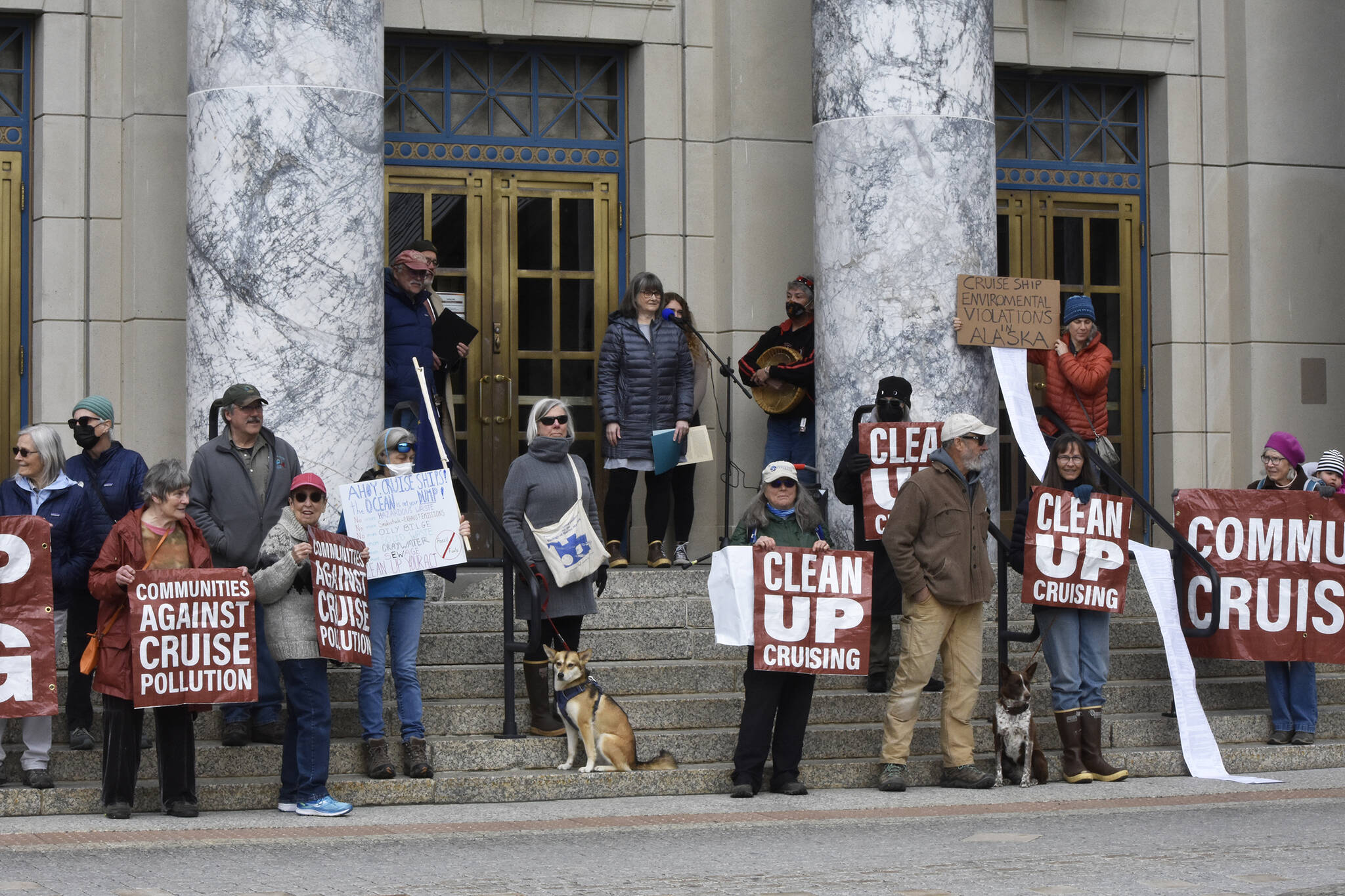As large cruise ships returned to Juneau Monday, protesters held a rally on the steps of the Alaska State Capitol building calling for increased enforcement of environmental regulations aboard ships.
Demonstrators said the cruise ship companies often skirt environmental regulations and dump wastewater into the state’s waters, and called for the reinstatement of the Ocean Ranger program, which requires an environmental monitor from the state to travel aboard the ships while in Alaskan waters. The program was created by voter initiative in 2006 but was defunded in 2019. Gov. Mike Dunleavy has submitted bills to the Alaska State Legislature to remove the program entirely.
The event was hosted by Karla Hart, a member of Juneau Cruise Control which in 2021 attempted to place three ballot initiatives severely limiting large cruise ships in Juneau on the municipal ballot. The group failed to collect enough signatures. Monday, Hart and other activists called for stricter air and water regulations aboard ships.
“There are big externalized costs,” Hart said of the cruise ship industry’s impact.
Guy Archibald, an environmental scientist formerly with the Southeast Alaska Conservation Council, said the cruise ship industry lobbied the state government to weaken environmental regulations, allowing ships to discharge wastewater while docked in port or in sensitive Alaskan waters.
[Modest welcome and big hopes for 1st cruise ship of the season]
“That’s the impact of cruise ships you don’t see,” Archibald said. “Alaska is unique because of our clean water resources, we can’t allow one industry to distort the largest clean water resources in the country.”
In January, Princess Cruises pleaded guilty to violating its probation for the second time for failing to establish and maintain an independent internal investigative office following a 2017 conviction. Princess was fined $40 million in 2017 for illegal discharge of oil-contaminated water and intentional acts to cover it up, according to the U.S. Department of Justice.
In past years, the Alaska Department of Environmental Conservation has issued air quality violations to ships from multiple cruise ship companies.
In an email, DEC Division Director Randy Bates said the department has the ability to regulate cruise ships, and how the state oversees the industry has evolved over the years.
“The ocean rangers served a purpose, provided reports to DEC, and allowed our department to evaluate if there are gaps in the environmental compliance and regulatory oversight of the large commercial passenger vessels,” Bates stated. “We believe that the proposed changes will improve our ability to effectively manage the industry in a more cost effective manner, while also providing opportunities for our communities to improve their treatment facilities, collectively doing a better job of protecting human health and the environment.”
Before the COVID-19 pandemic effectively shut down or curtailed the cruise ship industry for two years, Juneau residents were becoming increasingly vocal about managing the impacts of the industry. Before 2020, the number of tourists arriving in Juneau and other Southeast Alaska towns was increasing annually, with 2020 predicted to be the busiest year on record with 1.5 million passengers.
Brian Salerno, senior vice president of global maritime policy at Cruise Lines International Association previously told the Empire the industry was making similar projections for Alaska in 2022.
The industry is expected to return in full force this summer, and starting Monday, May 2, Juneau is scheduled to have at least one — but usually more — large ships in port every day until September.
Norwegian Cruise Line’s Norwegian Bliss which arrived in Juneau Monday has a guest capacity of 4,004.
• Contact reporter Peter Segall at psegall@juneauempire.com. Follow him on Twitter at @SegallJnuEmpire.

